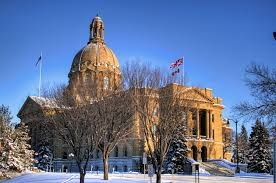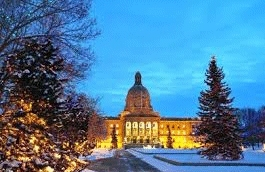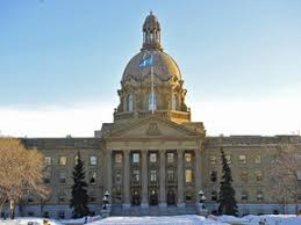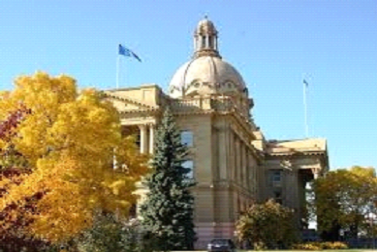This Week In Alberta
Posts of news-worthy articles and happenings around the province of Alberta.
Newsfeed
Добавил публикация
- US Treasury Secretary Scott Bessent publicly weighed in on Alberta’s separatist movement, claiming Canada has blocked pipeline access to the Pacific. In a television interview, Bessent described Albertans as independent and said there is talk of a possible referendum on leaving Canada, framing Alberta and the US as “natural partners” because of shared energy interests. Ottawa downplayed the remarks, saying Canada will focus on strengthening its own economy and sovereignty rather than reacting to foreign commentary. Alberta’s government responded by stressing that most residents do not want to join the United States and that the Province supports remaining within a united Canada while expanding pipeline access in all directions. Meanwhile, independence organizers said their goal is sovereignty outside both Canada and the US, even as interest in the movement grows online and among some American political circles.
- Alberta has introduced a new family law process aimed at resolving divorces, child support, and parenting disputes more quickly and with less conflict. The Family Focused Protocol, launched by the Court of King’s Bench earlier this month, assigns each family a single judge to manage the case from start to finish and targets having trials scheduled within 18 months if matters are not settled. The system aims to reduce paperwork, limit repeated court applications, and allow multiple interim issues to be addressed together in a single, longer hearing. Supporters say this “conveyor belt” approach keeps cases moving and could lower legal costs while reducing emotional harm to families and children. The protocol also emphasizes early resolution and alternative dispute options to avoid unnecessary courtroom battles. About 30 justices will focus heavily on the new system, though court officials acknowledge there will be an adjustment period as lawyers and judges adapt.
- Farmers across Alberta are pushing back against proposed federal animal traceability rules, warning the changes would place heavy costs and administrative burdens on small producers. The Canadian Food Inspection Agency had planned to require faster and more detailed reporting of livestock movements through an online system, but paused the rollout after widespread industry opposition. Producers say the shortened reporting timelines, mandatory premises IDs, and added technology costs would be difficult to manage, particularly for older farmers or smaller operations. Many worry the rules could drive small farms out of business, weaken rural communities, and raise food prices for consumers. While the federal agency argues the changes would improve disease control and market access, Alberta’s agriculture minister and industry groups say the system must reflect real-world farming conditions. A petition opposing the rules has quickly gained thousands of signatures.
- Alberta has refused to participate in Ottawa’s national firearm buyback program. While the federal program is voluntary, owning the banned guns remains illegal, and owners must submit a declaration by March 31st to be eligible for possible compensation. Because Alberta will not enforce or support the program, local police and RCMP will not collect firearms through the buyback, leaving Ottawa responsible for arranging its own seizure agents or mobile collection units. Federal officials warn that compensation may not be possible unless provinces like Alberta allow the program to operate locally. Some gun owners and businesses are skeptical, citing past delays and payment disputes with earlier buyback efforts.
- Recall campaigns targeting Alberta MLAs have faced significant challenges collecting the thousands of signatures required to trigger a recall election. The high-profile campaign against Education Minister Demetrios Nicolaides fell far short of the required threshold, ultimately failing. Organizers say the goal is increasingly symbolic - demonstrating voter dissatisfaction rather than successfully ousting MLAs. In Calgary-North, the campaign against MLA Muhammad Yaseen has struggled to gain traction, collecting only a fraction of the needed signatures despite close margins in past elections. Efforts to canvass indoors have been limited, with many businesses unwilling to host petitioners.
Добавил публикация
- Canvassing is underway for Alberta’s Stay Free Alberta petition, which seeks a referendum on separating from Canada. Supporters at recent events expressed frustration with federal overreach, concerns over economic stability, and a desire for more control over taxes and resource exports. Many believe independence would allow Albertans to make their own decisions and better protect future generations financially. The petition, approved by Elections Alberta, requires 177,732 signatures by May 2nd, and organizers say strong turnout indicates they are on track to meet the goal. Additional canvassing events are scheduled across the province in the coming weeks.
- Tensions are escalating as US officials, including Trade Representative Jamieson Greer and Montana State Senator Steve Daines, characterize Alberta’s electricity market rules as discriminatory toward American producers. They claim that the Alberta Electricity System Operator (AESO) prevents Montana power from entering the province, which stifles cross-border investment. Alberta Utilities Minister Nathan Neudorf asserts that the Province treats all neighbouring jurisdictions equally and prioritizes grid stability. Alberta is effectively an “energy island” with limited ties to BC, Saskatchewan, and Montana, meaning curtailments can occur when supply exceeds what the system can safely manage, even if imported power is cheaper. While increasing connections would improve reliability, Neudorf says that necessary infrastructure work could cost $500 million. Another Montana State Senator, Daniel Zolnikov, cautions that investors will avoid new projects until regulatory clarity is established.
- Wineries, retailers, and restaurants are calling on the Alberta government to repeal its new wine tax, introduced in April 2025, which imposes additional charges of 5-15% on bottles over $15 per litre. Industry representatives say the tax disrupts Alberta’s previously competitive liquor model, increases costs for restaurants, and discourages consumer spending, with some businesses absorbing the higher prices and others reducing Canadian wine purchases. The Import Vintners and Spirits Association and Wine Growers British Columbia warn that the tax has already caused declining sales and threatens small businesses, with some BC wineries considering leaving the Alberta market. Restaurant owners say the added costs are unsustainable, reducing customer visits and squeezing already tight profit margins. Industry groups argue that Alberta should maintain a simple, flat liquor tax to support business viability and consumer choice. Government officials defend the tax, noting it applies to only 16% of wines sold and remains lower than prices in other provinces.
- Alberta is introducing new regulations to expand its provincially-regulated online gambling market and attract private operators currently limited to Ontario. The changes provide a framework for companies like BetMGM, FanDuel, and DraftKings to legally accept bets in the province. The government notes that unregulated sites make up as much as 70% of Alberta’s online gambling activity. The regulations, modelled on Ontario’s system, cover virtual casinos, sports betting, tax rates, website rules, and responsible gambling measures such as self-exclusion and time or financial limits. Service Alberta Minister Dale Nally expects operators to join the market within a few months, with the intention of creating a safer and more controlled environment for Albertans. Currently, the province’s only regulated platform, Play Alberta, generated $270 million in net sales last year, up $35 million from 2023-24.
- An Alberta teacher’s audio rant criticizing the province’s conservative political culture has sparked an internal review by Elk Island Catholic Schools and criticism from Premier Danielle Smith. The recording, from a Fort Saskatchewan social studies class, included profane references to anti-Trudeau stickers and NDP lawn signs, prompting concerns about professionalism and political neutrality in the classroom. The school division says the conduct does not align with its values and is investigating, while the Alberta Teachers’ Association has declined to comment, noting it is a matter for the school.
Добавил публикация
- Premier Danielle Smith is renewing her push for expanded pipeline access to global markets in light of recent events. Smith said the US military’s capture of Venezuelan President Nicolas Maduro - and Washington’s stated interest in securing Venezuela’s oil resources - shows the risks of relying on unstable or politically sensitive suppliers. Smith argues Canada should prioritize exporting its own oil to a wider range of buyers, including Asian markets, through a new pipeline to British Columbia’s West Coast. She pointed to a recent agreement with Prime Minister Mark Carney that sets timelines for a potential Indigenous co-owned pipeline and reviews federal policies such as the tanker ban. Smith emphasized that Alberta supports pipelines “in all directions” and is urging Ottawa to move quickly, framing export diversification as both an economic and energy-security priority amid growing global uncertainty.
- Speaking of pipelines, the Alberta government has launched a new website to share information about a proposed bitumen pipeline to the northwest BC coast, positioning it as a central source for updates and public engagement. The site aims to address misinformation, emphasizing that construction has not started, no route has been finalized, and the Province is not funding the full project. Alberta has committed $14 million to early planning, with the expectation that private companies and Indigenous partners would eventually lead development. The project is tied to a recent federal-provincial energy agreement and could be submitted for federal review by July 1st under a process meant to accelerate projects of national interest. Early work includes Indigenous engagement, route and capacity planning, and assessing market demand and economic viability. While several major pipeline companies are advising the Province, no firm has yet agreed to build the pipeline.
- A recall effort targeting Alberta’s Education Minister Demetrios Nicolaides is running well behind pace, with organizers estimating roughly 6,000 signatures collected and about 10,000 more needed before the January 21st deadline to trigger a vote. The campaign organizer says a final push is planned but acknowledges reaching the threshold in such a short time would be difficult. The recall is part of a broader wave of petitions launched in late 2025, many driven by opposition to the government’s use of the notwithstanding clause to end a teachers’ strike. Even if it falls short, the organizer says the campaign has succeeded in increasing political engagement within the constituency.
- A petition calling for a referendum on Alberta separating from Canada has officially launched, with its inaugural signing event held in Water Valley and follow-up events in Didsbury and Westrose. The petition, managed by the newly created group Stay Free Alberta, aims to collect 177,732 valid signatures by May 2nd to trigger a constitutional referendum, with only registered canvassers allowed to gather signatures. Alberta Prosperity Project, which helped organize the initial events, continues as an educational group promoting independence information, while Stay Free Alberta handles the official petition process. Additional signing events are planned across the province throughout January as more canvassers are approved and trained.
- Several Alberta school boards have removed a limited number of library books following the Province’s new policy restricting sexually explicit images in school materials. Edmonton Public Schools pulled 34 titles, while the Calgary Board of Education removed 44 - both emphasizing that these represent a very small share of their overall collections. Edmonton Catholic Schools reported removing six titles. None of the divisions released specific book lists, noting the reviews are ongoing and subject to change. The policy, introduced by the Government of Alberta, was revised in the fall to focus on explicit images rather than written descriptions, after concerns were raised that well-known literary works could be unintentionally caught by the rules. Premier Danielle Smith and Education Minister Demetrios Nicolaides have said the intent is not to restrict classic or challenging literature.
Добавил публикация
- Premier Danielle Smith has completed the legal restructuring of the province’s health system in 2025, replacing Alberta Health Services with four new agencies overseeing hospital care, continuing care, mental health and addiction, and primary health. Smith plans to use 2026 to demonstrate the results of the reforms, including a public dashboard tracking wait times and 1,500 new continuing care spaces annually. Expanding nurse practitioners’ ability to open practices aims to improve primary care access. Smith defends the changes as necessary to reduce bureaucracy, but critics, including the NDP, argue the restructuring has created chaos for front-line workers and contributes to instability in government. Smith has emphasized accountability and the optimization of the new health agencies as central to her government’s priorities.
- Alberta Indigenous Relations Minister Rajan Sawhney says support for a proposed new West Coast oil pipeline among First Nations is currently mixed, estimating it at about evenly split between support and concern. She argues that opposition from outspoken groups will not delay Alberta’s plan to submit a pipeline proposal to the federal Major Projects Office by mid-2026, with deeper consultation to follow afterward. Sawhney says many communities are not outright opposed but are seeking answers about safety, spill risks, and modern tanker and pipeline technology. She maintains that no single organization speaks for all Indigenous communities along a potential route and emphasizes the importance of direct, in-person engagement. The project would require an exemption from the federal oil tanker ban on BC’s northwest coast and has already drawn resistance from some coastal First Nations groups.
- UCP MLA Rebecca Schulz has resigned from Alberta’s cabinet, where she was serving as Minister of Environment and Protected Areas. She will remain the MLA for Calgary-Shaw only until May 2026. Schulz said the decision was about timing and pursuing new career opportunities. Her departure has fuelled speculation that Premier Danielle Smith may call an early provincial election, though Alberta’s fixed election date is in 2027. Smith thanked Schulz for her service and appointed Grant Hunter as the new environment minister, with Justin Wright becoming government whip. Schulz says she will continue supporting the UCP and hopes to be remembered as a strong advocate for economic growth and fiscal responsibility.
- The National Police Federation has criticized the Alberta Next Panel’s recommendation to create a provincial police service, arguing that Albertans are more concerned with issues like health care and education than changing policing. The panel’s report recommends establishing the Alberta Police Service (APS) and transitioning community policing from the RCMP and municipal services to the new agency, while ensuring current RCMP staff have employment opportunities. Alberta RCMP Deputy Commissioner Trevor Daroux emphasized that policing decisions rest with the Province and that the RCMP will continue serving roughly 40% of Albertans across 95% of the province. Daroux noted recruitment and retention challenges but highlighted that more than 4,600 applications have led to additional officers and civilian positions since April 2024. Alberta has already passed legislation, including the Public Safety and Emergency Services Statutes Amendment Act 2025, to support the new Alberta Sheriffs Police Service (ASPS). Public Safety Minister Mike Ellis said more legislation is expected and the government is reviewing the panel’s recommendations to improve public safety and give municipalities more policing options.
- Premier Danielle Smith says Calgary’s second major break of the Bearspaw south feeder water main in under two years highlights a failure of oversight, and suggested that the Province may need to take a more active role in supervising the city’s water system. Smith placed responsibility on former Calgary Mayor and current NDP leader Naheed Nenshi, claiming he did not act after the 2013 floods to inspect the feeder main, a claim Nenshi called “total garbage.” Smith indicated provincial oversight could include issuing repair orders and linking future funding to greater control over the system. Calgary has lost over 20% of water to leaks in recent years, well above the provincial goal of 10%.
Добавил публикация
- The Alberta Teachers’ Association has filed a labour relations complaint and 61 grievances, accusing the Province’s bargaining agent of negotiating in bad faith over its promise to hire 3,000 new teachers. The union says the government failed to clearly disclose its true position during bargaining, particularly whether those teachers would be additional to positions already funded in the 2025 budget. According to the ATA, the government later suggested the hires were not truly “net new,” which the union argues undermines what was agreed to at the bargaining table. ATA President Jason Schilling said the union is seeking clarity and accountability for commitments made to end the teachers’ strike. The government says Bill 2 was intended to get students back in class and that it will respond to the complaint through the legal process. The dispute now centres on whether the promised teachers must be funded and hired on top of existing budgeted staffing plans.
- Canada and Alberta have agreed to a one-year extension of their child-care agreements, keeping average fees at about $15 per day until March 2027. Ottawa will transfer more than $1.17 billion to Alberta in 2026-27 to maintain affordability grants and support licensed operators while longer-term negotiations continue. While parents and providers welcomed the short-term relief, many warned the brief extension creates ongoing uncertainty about future fees, space creation, and workforce participation. Parents say the lack of clarity has heightened stress, especially given rising wait lists and the risk of fees increasing sharply without federal support. Child-care operators echoed those concerns, calling the extension a temporary fix that does not address structural issues, including caps on for-profit spaces and late-stage licensing decisions. Both governments say the extension buys time to negotiate a more durable framework, but families and providers are urging a multi-year deal to restore stability.
- A Legislative Committee has approved an extra $6.7 million for Elections Alberta to manage a surge in recall petitions targeting MLAs, most of them directed at the governing United Conservative Party. The funding follows advice from the Chief Electoral Officer that verifying the 21 petitions issued since late October, along with staffing and mailing costs, far exceeded the agency’s existing budget. Committee members unanimously supported the increase. In a separate decision, the Committee granted Elections Alberta an additional $3 million to prepare for a likely provincial referendum next year. While the funding requests were largely approved, the Committee did not fully meet Elections Alberta’s proposed budget for the next fiscal year.
- The Alberta government amended Bill 14 after the Province’s Chief Electoral Officer warned it could undermine democratic independence and create the perception of partisan influence. Gordon McClure said the bill risked eroding the separation of powers by allowing the Justice Minister to direct the Chief Electoral Officer’s actions. In response, Justice Minister Mickey Amery introduced amendments removing provisions that would have required ministerial approval to block similar referendum questions and eliminating a clause allowing the Minister to refer petition questions to court. The government says the changes restore balance and prevent delays to citizen-led democracy. Opposition leaders argue the amendments fail to address the core concerns and instead weaken oversight by limiting the ability to challenge problematic referendum questions.
- Alberta’s Auditor General, Doug Wylie, has called on the UCP government to improve public performance reporting across the province’s health care system. His report found that Alberta Health Services’ reporting during its final years was inconsistent, low-quality, and often did not follow established guidelines, making it difficult to assess the impact of health system changes. Wylie highlighted delays in producing business plans, unclear performance measures, and a lack of authoritative policies to guide staff. He emphasized that transparent reporting is essential for Albertans to understand whether recent restructuring, including the division of the health portfolio into four departments, is achieving its goals. The report recommends creating a clear provincial reporting framework, updating outdated accountability documents, and ensuring all publicly funded health organizations follow consistent policies and procedures. Alberta Health Services and the Primary and Preventive Health Services Ministry have said they accept the recommendations and are working to address the concerns.
Добавил публикация
- The UCP government has unveiled a plan to oppose Ottawa’s assault-style firearm ban and voluntary buyback program, arguing the federal initiative exceeds Ottawa’s authority and infringes on Albertans’ property rights. A motion introduced under the Alberta Sovereignty Within a United Canada Act states that firearm ownership is a provincial matter and cites the Alberta Bill of Rights, which protects the right to acquire, keep, and use property. The Province says it will use all legal means to prevent provincial entities, including police services, from enforcing or assisting with the federal program. The proposal directs the Attorney General to review prosecution guidelines related to firearm possession and self-defence and instructs the Minister of Public Safety to block participation from police or contracted RCMP. Federal rules ban over 2,500 models of firearms, with a voluntary buyback and an amnesty period until October 2026 before possession becomes an offence.
- Nearly one-quarter of Alberta’s MLAs are now facing citizen-led recall petitions, with four new petitions approved, including one targeting Calgary-Beddington NDP MLA Amanda Chapman. Most petitions target members of Premier Danielle Smith’s United Conservative caucus, though Chapman’s petition makes the effort somewhat bipartisan. Petitioners cite reasons such as inadequate engagement with constituents and support for the use of the Charter’s notwithstanding clause during the teachers’ strike. The Chief Electoral Officer, Gordon McClure, described the level of activity as unprecedented, noting 21 petitions in the 87-seat legislature and estimating it will cost nearly $7 million to process. Smith and her caucus argue the recall process is being misused for policy disagreements rather than serious misconduct, while NDP Leader Naheed Nenshi criticized the government for resisting constituent feedback. Under Alberta’s Recall Act, petitioners have three months to collect signatures equaling 60% of votes cast in the last election, with successful petitions triggering a vote and, if lost, a byelection.
- Alberta’s United Conservative government introduced Bill 14, the Justice Statutes Amendment Act, 2025, which amends seven pieces of legislation and imposes new restrictions on political party names to prevent voter confusion. The bill bans the use of words associated with existing parties, such as “conservative,” “liberal,” and “green,” effectively blocking attempts to revive the Progressive Conservative Party. Justice Minister Mickey Amery said the changes are meant to ensure clarity on ballots and denied they were aimed at separatists or former party members. Bill 14 also amends the Citizen Initiative Act, giving the Justice Minister sole authority to refer future referendum proposals to the courts. The bill takes effect retroactively from July 4th.
- An Alberta judge had ruled that a proposed referendum question on the province’s independence would violate the Constitution Act, including Charter and Treaty rights. The question, submitted by the Alberta Prosperity Project, asked whether Alberta should become a sovereign country and cease to be part of Canada. The decision came shortly after the provincial government introduced Bill 14. Justice Colin Feasby criticized the government’s move, saying it disrespects the administration of justice and undermines democracy by attempting to “silence the court.”
- Elections Alberta has verified the “Forever Canadian” petition, which urges the Province to formally support remaining in Canada, after confirming more than 404,000 valid signatures through statistical sampling. Launched as a response to separatist efforts, the initiative asks the legislature to affirm Alberta’s place within Canada rather than send the issue to a referendum. Organizer Thomas Lukaszuk said a vote on independence would be costly, polarizing, and harmful to investor confidence, and argued the strong signature count should guide the government’s next steps. The proposal has now been submitted to the Speaker and must be referred to a Legislative Committee within 10 sitting days. That committee can recommend either adopting the policy directly or sending it to a referendum aligned with the 2027 provincial election.
Добавил публикация
- We don't usually ask for a favour in these emails, but right now, we're running our Black Friday / Giving Tuesday fundraiser, and if we can raise $25,000 by the end of tomorrow, a very generous donor has offered to double every single donation. So, if you like the research and advocacy work we do, and the information we bring you, and would like to make a donation to support the cause of freedom, now is the perfect time! Info on how to donate online, or by cheque, is available here.
- A new memorandum of understanding between Ottawa and Alberta lays out a plan to pursue a privately funded bitumen pipeline through northern British Columbia while addressing most of the federal environmental laws Alberta has long opposed. The agreement commits both governments to collaboration on a million-barrels-per-day pipeline aimed at Asian markets, paired with major projects including the Pathways carbon capture system and a mandated 75% reduction in provincial methane emissions. Ottawa has agreed to suspend clean electricity rules, drop the oil and gas emissions cap, and consider adjustments to the West Coast tanker ban as part of the deal. Alberta must submit its pipeline application to the federal major projects office by July 1st, with both sides framing the project as a national economic opportunity that could create tens of thousands of jobs. British Columbia’s government and coastal First Nations remain firmly against any new pipeline, citing spill risks and the lack of a private-sector proponent.
- Alberta is now projecting a $6.4-billion second-quarter deficit as falling oil prices, higher expenses, and new US tariffs weigh heavily on the Province’s finances. Finance Minister Nate Horner said global trade tensions and a weaker energy market have sharply reduced non-renewable resource revenue, which is down 30% from last year. While a new energy agreement with Ottawa is expected to boost long-term investment certainty, it won’t provide immediate fiscal relief. Revenues are down across several categories, particularly personal income taxes, though corporate taxes remain stronger than expected. Expenses have edged higher due to labour settlements, emergency funding, and health-care initiatives, including money for continuing care and psychiatric beds. Despite these pressures, Alberta’s GDP growth is still expected to lead the country at 2.1%, supported by strong oil production and increased building activity. Population growth also remains the fastest in Canada, though unemployment among young Albertans is rising. The Heritage Savings Trust Fund continues to grow, too, reaching a projected $31.5 billion after earning $770 million in the second quarter.
- The Alberta government is moving to crack down on contraband tobacco with Bill 12, which would impose harsher penalties on anyone buying, selling, or possessing illegal tobacco products. Proposed fines would be triple the tax owed on legal tobacco, covering cigarettes, fine-cut tobacco, and cigars over 1,000 grams. The announcement follows a major seizure near Lloydminster, where RCMP intercepted 8.8 million unstamped cigarettes valued at $7.65 million. A study by the Convenience Industry Council of Canada found that illegal tobacco cost Alberta around $262 million in tax revenue from 2021 to 2023, with contraband now accounting for nearly 30% of the market. The legislation also mandates mandatory reporting of seizures, aiming to protect public health, support legal retailers, and recover lost revenue that funds provincial services.
- Since recreational cannabis was legalized in 2018, Alberta has collected the most tax revenue per capita of any province, generating about $210 per person and over $1 billion in total. While Ontario collected the largest provincial total at $1.5 billion, Alberta’s smaller population means its per-person revenue surpasses every other province, well ahead of the Northwest Territories ($135.80) and Yukon ($126.35). Alberta’s high revenue is attributed to its early rollout of licensed retail stores and a 16.8% additional tax on cannabis excise duties, the highest of any province. Critics say the surcharge, applied at the producer level, has limited market growth and may encourage some Albertans to continue buying from illegal sources.
Добавил публикация
- A court hearing is underway in Edmonton to determine whether a proposed referendum on Alberta separating from Canada is constitutional. The referendum question, submitted by Mitch Sylvestre of the Alberta Prosperity Project, asks voters whether “Alberta shall become a sovereign country and cease to be a province in Canada.” Arguments involve lawyers for Sylvestre, the Province’s Chief Electoral Officer, five First Nations intervenors, and two amicus curiae lawyers tasked with objectively examining constitutionality. The amicus lawyers argue the referendum would conflict with multiple constitutional provisions and remove protections for residents if Alberta became independent. Sylvestre’s lawyer contends Albertans should have the right to debate separation under the Citizen Initiative Act. First Nations groups argue the referendum would violate Aboriginal and Treaty rights. Court of King’s Bench Justice Colin Feasby is expected to issue a ruling at a later date.
- Alberta’s government released the report from its “Aggression and Complexity in Schools Action Team,” a 25-member group formed to address rising behavioural and learning challenges in classrooms. The report identifies factors such as academic struggles, behavioural issues, socioeconomic pressures, language barriers, and mental-health concerns as contributors to classroom complexity. It recommends developing class-size criteria, improving cross-ministry coordination to help families navigate supports, and restoring expanded early-childhood funding that had previously been cut. The government says detailed class-size and composition data - being collected throughout November and released in January - will guide future decisions. Premier Danielle Smith and Education Minister Demetrios Nicolaides also committed to hiring 1,500 additional education assistants and 3,000 more teachers over the next three years. Cross-ministry collaboration, involving mental health, children’s services and social services, will shape the next phase of planning. Some immediate steps are still undefined, as Nicolaides said the report must first go to a cabinet committee before resources are allocated.
- The Alberta government has invoked the notwithstanding clause to shield three laws affecting transgender youth and adults from ongoing and future court challenges. Premier Danielle Smith argues the move is necessary to protect children, particularly provisions that restrict puberty blockers and hormone therapy for those under 16 and ban gender-affirming surgeries for minors. The laws also require parents to be notified if a child under 16 changes their name or pronouns at school, and restrict female sports divisions to individuals born female. Supporters of legal challenges argue the government is avoiding judicial scrutiny and spreading misinformation. Smith counters that long court delays would put children at risk and says the government is reflecting the will of most Albertans. Despite the clause, advocacy groups plan to continue their legal fight.
- A new report from Alberta’s Auditor General concludes the Province wasted about $125 million on failed efforts to privatize community lab services through Dynalife. The investigation found major breakdowns in procurement, financial analysis, and governance, with the health ministry inserting itself into decisions that should have been made by Alberta Health Services. When Dynalife took over in late 2022, patients - especially in Calgary - faced long waits, reduced access, delayed test results, and a spike in diagnostic errors. The deal collapsed within months as Dynalife warned it was nearing bankruptcy, forcing the government to buy out its assets and return lab work to the public system. Wylie’s report also criticizes poor record-keeping, restricted access to information, and destroyed documents that hampered the investigation. Opposition MLAs say the findings show the dangers of health-care privatization, while the government insists it acted quickly once service problems became clear. The Auditor General is conducting additional probes into other recent procurement issues, even as the government has chosen not to renew his contract.
- Speaking of the healthcare system, Premier Danielle Smith has confirmed plans to let doctors work in both the public and private systems under a new “Dual Practice Surgery Model,” which she says will reduce wait times by allowing surgeons to perform required public surgeries while taking on additional private procedures in their off-hours. The government argues the change could help retain physicians and address the backlog of more than 80,000 people waiting for elective surgeries. Medical organizations, however, warn the move could deepen inequality, lengthen public wait times, and force patients to pay twice for care. Alberta’s medical students say a two-tier system would disadvantage those unable to afford private treatment, while some physicians question whether burned-out staff have capacity for extra work at all. Critics also warn the plan may violate the Canada Health Act, risking federal penalties or legal challenges. Supporters say the model aligns Alberta with countries like Sweden and Australia.
Добавил публикация
- Prime Minister Mark Carney unveiled a second group of major projects being considered for fast-track federal approval, and Alberta’s premier signalled support despite her own priorities not making the list. The new slate includes mines, a hydro project, a transmission line, and an LNG proposal, but does not include the bitumen pipeline Alberta continues to push. Premier Danielle Smith said negotiations with Ottawa over the pipeline and the removal or overhaul of federal laws she believes hinder investment are still underway. She indicated the talks are reaching a critical point, while the Prime Minister said more time is needed to finalize details. He stressed that Alberta must commit to investments that prepare its energy sector for a lower-carbon future. British Columbia’s Premier criticized Alberta’s pipeline idea, saying no real project exists and warning of massive taxpayer costs.
- Alberta is moving to formalize early-years math and reading assessments by writing them directly into the Education Act through Bill 6. The proposal would require school boards and early childhood service operators to screen all kindergarten to Grade 3 students and report results to both parents and the province. The Education Minister says legislating the assessments will ensure consistency, help identify learning needs earlier, and keep future governments focused on literacy and numeracy. Critics, including the NDP and the teachers’ union, argue the change is unnecessary, time-consuming for already stretched classrooms, and not matched with adequate funding. The Province has allocated $11 million to support implementation, though opponents say it falls far short of what schools need. If passed, the requirements would take effect in fall 2026 and apply across all publicly funded and accredited independent schools. Regulations determining how often screenings occur and possible exemptions will be developed later.
- More than 1,200 local officials gathered in Calgary for the 2025 Alberta Municipalities Convention, where one key debate focused on who should collect the provincial education property tax. A resolution from Rocky Mountain House called for the province to take over tax collection, arguing that rising education requisitions confuse residents and unfairly place blame on municipalities. Supporters said local governments shoulder the administrative burden and the public frustration despite the Province driving the increases. Calgary’s Mayor backed the push for reform, saying residents deserve transparency about where their money is going. The Province noted that municipalities have long collected these taxes but confirmed it is exploring whether a new provincial tax agency could assume the role. This is the fourth time since 2011 that municipalities have debated similar reforms.
- Alberta has already allocated all 1,200 megawatts of its temporary large-load power capacity to two major data centre projects near Edmonton, leaving 37 other proposals without access to the provincial grid. The remaining projects must now either build their own on-site power generation or wait years for new grid infrastructure, as experts warn that transmission upgrades alone can take a decade. This bottleneck poses a challenge to the province’s goal of attracting $100 billion in AI data-centre investment, with electricity demand from proposed facilities far exceeding available supply. Premier Danielle Smith has directed the Utilities Minister to fast-track projects that bring their own power, reflecting the government’s push to ease pressure on the grid. AESO data shows developers have requested nearly 20 gigawatts of load but proposed less than five gigawatts of new generation, prompting the cap and the launch of a second phase of the integration program. Phase 2 will focus on long-term solutions and clearer pathways for “bring your own generation” models, with industry consultations beginning later this month. The Province says it supports AESO’s cautious approach, emphasizing reliability and affordability for Albertans while still pursuing leadership in North America’s data-centre sector.
- The Alberta NDP has started a full-scale relaunch of party leader Naheed Nenshi nearly a year and a half into his leadership, releasing a polished new ad focused on his personal story and Albertans’ struggles with affordability, health care and education. The reintroduction comes with heavyweight outside help: the party hired the US-based Fight Agency, known for high-profile progressive wins in places like New York and Pennsylvania, to craft the ad. Party officials say the agency specializes in speaking to working-class voters in right-leaning regions, a weakness critics identified in the NDP’s 2023 campaign. At the same time, Nenshi has stacked his senior team with former federal Liberal strategists rather than traditional New Democrats, drawing from the orbit of Mark Carney and Justin Trudeau. The ad avoids specifics on policy and downplays Nenshi’s academic pedigree, aiming instead to present him as a champion of “ordinary Albertans.”
Добавил публикация
- The Alberta Teachers’ Association has launched a constitutional challenge to the Province’s Back to School Act, which used the notwithstanding clause to end last month’s teachers’ strike and impose a rejected contract. ATA president Jason Schilling said the government’s move was an “abuse of power” and a violation of teachers’ Charter rights to free expression and association. The union’s filing in Alberta’s Court of King’s Bench seeks an injunction to pause the law’s effects while the challenge is heard. Justice Minister Mickey Amery defended the government’s use of the clause, saying it ensured students returned to class after three weeks of disruption. Legal experts say the ATA faces an uphill battle, as courts have traditionally deferred to provincial authority when the clause is invoked.
- Speaking of education, Premier Danielle Smith and Education Minister Demetrios Nicolaides have launched an 11-member task force to address classroom size and complexity, co-chaired by the two leaders. The committee includes Cabinet Ministers, school superintendents, and one Alberta Teachers’ Association representative, but no frontline teachers. Instead, a separate teacher advisory council will be established to provide direct feedback to the Minister over the next two years. Nicolaides said the goal is to act quickly on class size tracking, inclusive education, and modular classroom planning. ATA president Jason Schilling said the move shows teachers were heard.
- Alberta and the federal government are in high-level talks to sign a memorandum of understanding that could mark a turning point in their strained relationship. Officials on both sides confirmed negotiations are underway, with a goal of finalizing the deal before the Grey Cup on November 16th. The accord would address long-standing disputes over federal climate and energy policies, including emissions caps and clean electricity rules that Alberta has fiercely opposed. Premier Danielle Smith said she will withhold judgment until the talks conclude, adding that she wants to see Ottawa “remove, carve out or overhaul” policies she blames for economic harm. The discussions come as both governments promote investment and energy growth, leading some to hope for a “grand bargain.”
- Premier Danielle Smith is considering changes to Alberta’s Recall Act amid growing political backlash and a surge of recall petitions targeting United Conservative Party MLAs. Speaking at the legislature, Smith said her government is reviewing the rules after reports of improper fundraising linked to recall efforts. At least two petitions have been approved, with 22 MLAs listed online as potential targets, many tied to anger over the government’s use of the notwithstanding clause to end the teachers’ strike. Agriculture Minister RJ Sigurdson said his staff and family have faced threats and harassment, calling out “deeply concerning” behaviour. Opposition Leader Naheed Nenshi accused Smith of trying to shield herself from public accountability, saying recall is part of democracy.
- The Provincial government is considering raising the speed limit on divided highways from 110 km/h to 120 km/h and has launched a public survey to gauge support. Transportation Minister Devin Dreeshen said the proposal focuses on four-lane highways such as Highway 2 between Edmonton and Calgary, which he said were engineered for higher speeds. The online survey, open until December 12th, also asks whether commercial trucks should be restricted from using the far left lanes on multi-lane routes. Dreeshen said a pilot project will follow to measure safety and traffic impacts, noting that many Albertans already drive near the proposed limit. The move follows earlier interest from the UCP caucus, including a 2021 private member’s bill that failed to advance.
Добавил публикация
- The Alberta Teachers’ Association (ATA) is weighing a legal challenge to the provincial government’s Back to School Act, which invoked the notwithstanding clause to end the teachers’ strike and prevent future court challenges. ATA president Jason Schilling said the Association will oppose what it views as an abuse of power “with every tool the law provides.” Although the clause shields the legislation from being overturned, courts could still issue declarations on whether it violates Charter rights. Ongoing cases in Saskatchewan and Quebec, both under appeal to the Supreme Court of Canada, may determine how far courts can review such laws. The Canadian Bar Association’s Alberta branch and the Canadian Civil Liberties Association expressed concern that bypassing judicial review weakens democratic accountability. Teachers have returned to classrooms, but the ATA is still assessing its next legal steps.
- The UCP will once again collect and publicly report class size and composition data for all provincial schools, six years after the practice was ended. Education Minister Demetrios Nicolaides said the move follows recent labour unrest and aims to address concerns over classroom overcrowding and complexity. School boards must submit detailed reports by November 24th, with public data expected in January and annual releases to follow. The new census will track not only class sizes but also student needs, including those with disabilities, gifted learners, refugee and Indigenous students, and incidents of aggression or violence. Nicolaides said the data will guide policy and funding decisions, and the Province will establish a Class Size and Complexity Task Force to develop recommendations.
- Alberta, Ontario, and Saskatchewan are moving forward with a feasibility study for a potential east-west pipeline and energy corridor that would transport oil and gas to a proposed port on James Bay. The project was first discussed at a summer meeting of premiers and is now being advanced by Ontario Premier Doug Ford, who called it a nation-building initiative to enhance energy independence and open new export markets. Premier Danielle Smith and Saskatchewan Premier Scott Moe both praised the collaboration as a boost to Canada’s energy security. The study, which is expected to conclude next year, does not yet have a cost estimate.
- The Alberta government has introduced Bill 3, the Private Vocational Training Amendment Act, which will tighten oversight of private career colleges and improve transparency for students. Advanced Education Minister Myles McDougall said the legislation attempts to curb misleading claims about student loans and job prospects, citing reports of institutions telling students that loans were free or that attendance wasn’t required. The bill would require colleges to disclose graduate employment rates, strengthen curriculum standards, and allow regulators to suspend licences or issue stop orders for violations. It also targets third-party recruiters who mislead students and establishes a compensation fund for those affected by cancelled programs. The Province says these measures will protect students while maintaining confidence in Alberta’s growing private training sector. Industry representatives have endorsed the move, saying it will help rebuild trust by holding low-quality institutions accountable without penalizing reputable career colleges.
- Bill 4, the Public Safety and Emergency Services Statutes Amendment Act 2025, has also been introduced this week. The legislation advances plans to establish the Alberta Sheriffs Police Service (ASPS) as an independent policing agency. It would create a labour relations model for ASPS officers under the Police Officers Collective Bargaining Act, allowing collective bargaining through police associations rather than unions. It would also permit permanent residents to serve as officers and align ASPS members with first responder protections under the Workers’ Compensation Act. Public Safety Minister Mike Ellis said the bill lays the groundwork for a major transition but acknowledged that costs and timelines are still being determined. The act also updates Clare’s Law, granting the Integrated Threat and Risk Assessment Centre (ITRAC) greater access to police databases to expedite domestic violence disclosures. Additional provisions allow cross-provincial inmate transfers, ensuring flexibility during emergencies like wildfires.
- Alberta’s NDP Opposition is calling for higher wages and stronger worker protections through Bill 201, the Employment Standards (Protecting Workers’ Pay) Amendment Act. The proposal would raise Alberta’s minimum wage from $15 to $18 per hour over three years and then index it to inflation. It would also eliminate the youth minimum wage differential and safeguard worker tips from employer deductions. NDP MLA Kathleen Ganley said the changes are needed to address Alberta’s affordability crisis and ensure equal pay for equal work. Alberta’s minimum wage, unchanged since 2018, is currently the lowest in Canada and the province is one of only two that still allows employers to pay youth less. Government House Leader Joseph Schow countered that rapid increases would hurt small businesses and employment.
Добавил публикация
- The Legislature is back in session, and the Throne Speech was delivered, outlining the provincial government’s agenda for the upcoming legislative session. Government House Leader Joseph Schow said 15 bills are planned, including measures to reduce red tape, prohibit regulators from requiring Canadian work experience, and prevent “undue discipline” in professional associations. Other legislation will adjust local election rules by tightening nomination requirements and will begin creating the Alberta Sheriffs Police Service. Schow said returning students to classrooms remains a key goal amid the ongoing teachers’ strike. Schow also reiterated the government’s readiness to use the notwithstanding clause to defend its existing laws on gender and education policy.
- Speaking of the teacher’s strike, Premier Danielle Smith says that back-to-work legislation will be introduced today. The strike, now in its fourth week, involves 51,000 teachers and affects 750,000 students across public, separate, and francophone schools. The government has offered a 12% wage increase over four years and a plan to hire 3,000 additional teachers, but educators argue this does not sufficiently address class sizes and special needs support. The proposed Back to School Act would be fast-tracked through the legislature using modified debate rules to allow quick passage. Alberta Teachers’ Association President Jason Schilling criticized the legislation as disrespectful and limiting democratic debate. Opposition NDP Leader Naheed Nenshi condemned the move, calling it an attack on education and democracy. The government maintains it remains open to negotiations if teachers initiate formal talks before the bill passes.
- Alberta’s government introduced Bill 1, the International Agreements Act, as its first piece of legislation for the fall session, asserting that international agreements will only apply in the province if passed under provincial law. Bill 1 would repeal the 1995 International Trade and Investment Agreements Implementation Act and require all international treaties affecting provincial jurisdiction to be debated and approved by the Legislature before taking effect. Premier Danielle Smith framed the bill as a defence of Alberta’s sovereignty, inspired by Quebec’s model, and emphasized that federal negotiators must include Alberta in agreements affecting areas like oil, gas, health, and education. Critics, including NDP Leader Naheed Nenshi, called the bill performative, unconstitutional, and a diversion from pressing provincial issues such as the ongoing teachers’ strike and challenges in health care. Notably, he didn't say any of this about Quebec's law.
- Changes in provincial voting legislation are expected shortly, designed to take aim at "long ballot" protests following a federal byelection that saw a record 214 candidates listed. The proposed bill would increase the number of nomination signatures required, prohibit individuals from signing multiple papers, and make it illegal to induce others to do so. Government House Leader Joseph Schow said the changes are meant to ensure only serious candidates appear on ballots. Critics say the proposal could discourage participation and undermine democratic confidence. Mount Royal University political scientist Lori Williams said Alberta hasn’t yet faced such protests but cautioned that overly restrictive rules could exclude legitimate candidates. She noted that fair safeguards, such as limiting how many papers a person can sign, could prevent abuse without narrowing access to the democratic process. The government is expected to table the legislation during the current session.
- Also in the works are plans to allow residents to privately purchase diagnostic tests and screenings, a move the Alberta government says will reduce wait times and attract private investment into the province’s health system. Under the proposal, Albertans could pay out of pocket for elective services such as imaging and preventative screenings, while physician-recommended tests would remain publicly funded. If a privately paid test identifies a serious medical condition, the cost would be reimbursed. Health Minister Adriana LaGrange described the change as expanding choice and strengthening preventative care, while critics argue it risks creating a two-tier system. NDP health critic Sarah Hoffman said privatization could divert resources from the public system and worsen wait times. The Province maintains that the reforms are intended to increase capacity, not replace public services, and there are plans to consult with medical and industry stakeholders before introducing the legislative changes.
- The Alberta government will end its hybrid work model for public service employees, requiring more than 12,000 workers to return to full-time, in-office work starting in February. Since March 2022, Alberta Public Service employees have been allowed to work from home up to two days per week under a temporary hybrid policy introduced during the pandemic. The Province said the policy is being discontinued due to changing conditions and broader workplace trends. Approximately 44% of Alberta’s government workforce was participating in the hybrid arrangement as of August. The government noted that it is following a similar move by Ontario, which will require its employees to return to the office full-time in early 2026. Officials added that while remote work will end, employees can still access other flexible arrangements, such as modified hours or work averaging policies.















